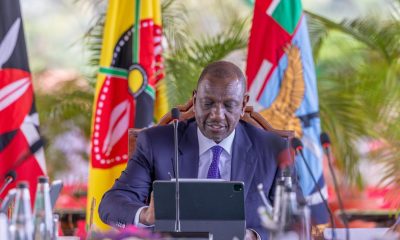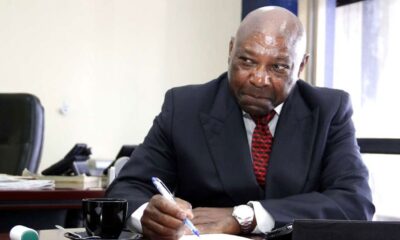Business
Inside Nairobi Securities Exchange Boardroom Wars and Plot to Oust CEO

Stockbrokers mobilize to remove Frank Mwiti after just one year in office, citing leadership failures and market disconnect
May 31, 2025
The Nairobi Securities Exchange (NSE) is embroiled in a bitter boardroom battle as stockbrokers launch an unprecedented campaign to oust Chief Executive Officer Frank Mwiti, barely a year after his appointment to lead Kenya’s premier capital market.
In a dramatic escalation of tensions at the bourse, the Kenya Association of Stockbrokers and Investment Banks (Kasib) has formally called for an extraordinary general meeting to remove Mwiti from office, accusing him of authoritarian leadership and making critical decisions that threaten the very foundation of Kenya’s stock market ecosystem.
The Catalyst for Conflict
The rebellion against Mwiti’s leadership centers on his alleged push for direct share trading that would bypass traditional stockbrokers – a move that threatens to undermine the business model that has sustained the market for decades. Stockbrokers, who collectively own 20 percent of the NSE, view this as an existential threat to their livelihood and a fundamental betrayal of the exchange’s core principles.
“We hereby express a vote of no confidence in the chief executive officer of the NSE,” Kasib declared in a scathing letter to NSE Chairman Kiprono Kittony. The lobby group, led by Chairman Donald Wangunyu, accused Mwiti of displaying “a disconnect from market realities and stakeholder relations.”
The controversy has exposed deep fractures within the NSE’s governance structure, with brokers claiming they have been systematically excluded from strategic decision-making processes that directly impact their businesses. At stake are brokerage commissions worth Sh1.9 billion annually – revenue that could be redirected to the exchange if direct trading becomes the norm.
A Pattern of Alleged Violations
The stockbrokers’ grievances extend beyond the direct trading issue. They have compiled a damning list of alleged procedural violations and leadership failures that paint a picture of an institution in crisis:
Strategic Secrecy: Mwiti stands accused of deliberately withholding the NSE’s strategic plan from stakeholders, keeping it secret to avoid scrutiny. “As Kasib members, we have been prevented from interrogating the strategy,” the brokers complained, expressing their intention to “disassociate themselves from a strategic plan that they are not privy to.”
Governance Breaches: The recent Annual General Meeting held on May 21 has become a flashpoint of controversy, with brokers alleging that the CEO failed to comply with the mandatory 21-day notice requirement – a fundamental breach of corporate governance standards.
Board Relations: Perhaps most damaging are accusations that Mwiti has been making material decisions without board knowledge, suggesting a breakdown in the relationship between the CEO and the NSE’s governing body.
The Power Struggle
This boardroom war represents the first major public confrontation between NSE leadership and traders since the exchange’s transformative 2014 initial public offering. That landmark event saw the bourse transition from a mutual company wholly owned by stockbrokers to a publicly traded entity, with foreign investors and the Kenyan government acquiring significant stakes.
The 2014 IPO fundamentally altered the power dynamics at the NSE. The Nairobi Securities Exchange sold up to a 38 percent stake in an initial public offering to raise funds for new products and enhance transparency. This demutualization process diluted stockbrokers’ control while introducing new stakeholders with different priorities and expectations.
Today, the ownership structure reflects this transformation. Foreign funds and overseas pension schemes now hold the largest stake at 23.82 percent combined, while the Treasury maintains a 3.35 percent stake. Individual stockbrokers have been relegated to holdings between 1.34 percent and 2.69 percent each – a dramatic fall from their previous position of complete ownership.
The Man in the Eye of the Storm
Frank Mwiti’s journey to the NSE CEO position began with considerable promise. Following the completion of Odundo’s tenure, the board announced the appointment of Frank Mwiti as the new Chief Executive of the NSE effective May 2, 2024, subject to appropriate regulatory approvals by the Capital Markets Authority.
Mwiti brought impressive credentials to the role, having served as a Partner at Ernst & Young and as the Eastern Africa Markets Leader. His appointment was seen as a fresh start for the exchange after Geoffrey Odundo’s nine-year tenure. The board praised him as “a dynamic and accomplished business leader,” and his extensive experience across PwC, EY-Parthenon, Deutsche Bank, and Afrika Kapital suggested he was well-equipped to navigate the complex challenges facing Kenya’s capital markets.
However, what was supposed to be a smooth transition has devolved into one of the most acrimonious leadership disputes in the NSE’s recent history.
The Constitutional Crisis
The mechanics of removing Mwiti reveal the complex constitutional arrangements governing the NSE. Under the exchange’s articles of association, the CEO can only be dismissed if all eight directors call for his resignation in writing. This creates a high bar for removal, requiring unanimous agreement among the board members.
The current NSE board comprises eight directors, including six non-executives: Donald Wangunyu (who doubles as Kasib Chairman), Risper Alaro, Stephen Chege, Caroline Kariuki, John Niepold, and Isis Nyong’o. The recent resignation of Paul Mwai, who represented trading participants, and the exit of independent director Michael Turner have created two vacant positions that have become additional sources of conflict.
Board Composition Battle
Beyond Mwiti’s removal, Kasib is waging a parallel campaign to secure strategic board positions. They are pushing for Nancy Noreh, a manager at Sterling Capital, to fill the seat vacated by Paul Mwai, and Tom Mulwa, managing director of Liaison Group, to occupy the independent director position left by Michael Turner’s departure.
“Trading participants insist on their right to maintain at least two representatives in the board,” Kasib declared, framing their demands in terms of fundamental representation rights rather than mere preference.
This battle for board control reflects deeper concerns about the direction of the NSE and who gets to shape its future. The stockbrokers view these positions as essential checkpoints against policies that could further marginalize their role in Kenya’s capital markets.
Market Implications
The timing of this leadership crisis could hardly be worse for Kenya’s capital markets, which face numerous challenges including limited new listings, declining trading volumes, and increased competition from alternative investment platforms. The NSE currently lists 64 companies with a total market capitalization of approximately Ksh2.16 trillion, with Safaricom alone controlling 44 percent of the market.
The public nature of this dispute threatens to undermine investor confidence at a time when the exchange can ill afford reputational damage. International investors, who have become significant stakeholders since the 2014 IPO, will be watching closely to see how the governance crisis unfolds.
The Regulatory Dimension
The allegations of procedural violations, particularly regarding the recent AGM, have potential regulatory implications. The Capital Markets Authority (CMA), which oversees the NSE’s operations, may need to intervene if governance standards have indeed been compromised.
The accusation that Mwiti’s direct trading push violates the Capital Markets Act 2023 and NSE direct market access guidelines adds another layer of complexity, potentially drawing regulatory scrutiny to the CEO’s strategic initiatives.
The Response
Mwiti has declined to comment directly on the ouster attempt, referring inquiries to Chairman Kittony since the formal complaint was addressed to the board rather than him personally. This strategic silence may reflect legal advice or an attempt to avoid inflaming tensions further.
Chairman Kittony has acknowledged receiving Kasib’s letter and indicated that consultations are underway. “I have received the letter from Kasib. As you know they are our key stakeholders. We will consult and get back to you,” he stated, suggesting the board is taking the concerns seriously.
The Deadline Approaches
Kasib has given the NSE board until June 19, 2025, to respond to their demands – a deadline that adds urgency to what could become a prolonged governance crisis. The three-week timeline reflects the brokers’ impatience with the current situation and their determination to force a resolution.
The approaching deadline will likely intensify behind-the-scenes negotiations as both sides seek to build support for their positions. The outcome will depend largely on the board’s appetite for change and their assessment of Mwiti’s leadership.
Context
The current crisis echoes patterns seen in other demutualized exchanges worldwide, where former member-owners struggle to adapt to new governance structures that dilute their influence. The NSE’s transition from mutual ownership to public company status was always going to create tensions between different stakeholder groups with competing interests.
The 2014 IPO was celebrated as a modernization milestone that would bring greater transparency and capital to the exchange. However, the current dispute suggests that the governance arrangements established during demutualization may not have adequately balanced the interests of all stakeholders.
What’s at Stake
This boardroom battle will determine not just Mwiti’s fate but the future direction of Kenya’s capital markets. If the stockbrokers succeed in their ouster attempt, it would send a powerful message about the continued influence of traditional market participants despite their reduced ownership stakes.
Conversely, if Mwiti survives the challenge, it could signal a definitive shift toward a more exchange-centric model that reduces reliance on traditional brokerage intermediation.
The resolution of this crisis will have far-reaching implications for:
- Market Structure: Whether Kenya’s capital markets evolve toward direct trading or maintain traditional brokerage-mediated transactions
- Governance Standards: How demutualized exchanges balance competing stakeholder interests
- Investor Confidence: Whether the NSE can maintain its reputation as a well-governed institution
- Regulatory Framework: Potential changes to oversight mechanisms for exchange governance
The Broader Picture
Beyond the immediate personalities and procedures involved, this dispute reflects fundamental questions about the evolution of capital markets in the digital age. Around the world, exchanges are grappling with disintermediation pressures as technology enables more direct connections between investors and markets.
The NSE’s experience may serve as a case study for other African exchanges navigating similar transitions. The outcome could influence approaches to demutualization and stakeholder management across the continent’s emerging capital markets.
Conclusion
As Kenya’s financial sector watches this drama unfold, the NSE boardroom war represents more than a simple leadership dispute. It embodies the tension between tradition and transformation, between established interests and emerging opportunities, between collective ownership and corporate governance.
The next few weeks will determine whether Frank Mwiti survives to implement his vision for the NSE or becomes another casualty of the complex politics that govern Kenya’s capital markets. Whatever the outcome, this crisis has already revealed deep structural challenges that will need to be addressed to ensure the long-term health of the Nairobi Securities Exchange.
The stakes could not be higher for an institution that plays a central role in Kenya’s economic development and serves as a gateway for international investment into East Africa’s largest economy. As the June 19 deadline approaches, all eyes will be on the NSE boardroom, where the future of Kenya’s capital markets hangs in the balance.
Kenya Insights allows guest blogging, if you want to be published on Kenya’s most authoritative and accurate blog, have an expose, news TIPS, story angles, human interest stories, drop us an email on [email protected] or via Telegram
-

 Grapevine2 weeks ago
Grapevine2 weeks agoAlleged Male Lover Claims His Life Is in Danger, Leaks Screenshots and Private Videos Linking SportPesa CEO Ronald Karauri
-

 Grapevine1 week ago
Grapevine1 week agoRussian Man’s Secret Sex Recordings Ignite Fury as Questions Mount Over Consent and Easy Pick-Ups in Nairobi
-

 News5 days ago
News5 days agoTHE FIRM IN THE DOCK: How Kaplan and Stratton Became the Most Scrutinised Law Firm in Kenya
-

 Investigations7 days ago
Investigations7 days agoMulti-Million Dollar Fraud: Three Kenyans Face US Extradition in Massive Cybercrime Conspiracy
-

 Economy6 days ago
Economy6 days agoIran Demands Arrest, Prosecution Of Kenya’s Cup of Joe Director Director Over Sh2.6 Billion Tea Fraud
-

 Business6 days ago
Business6 days agoA Farm in Kenya’s Rift Valley Ignites a National Reckoning With Israeli Investment
-

 Africa1 week ago
Africa1 week agoFBI Investigates Congresswoman Ilhan Omar’s Husband’s Sh3.8 Billion Businesses in Kenya, Somalia and Dubai
-

 Business2 weeks ago
Business2 weeks agoM-Gas Pursues Carbon Credit Billions as Koko Networks Wreckage Exposes Market’s Dark Underbelly























